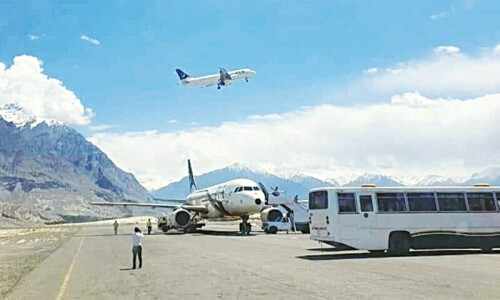THE approach to reforms in the tribal belt recently suggested at two civil society platforms merits serious attention by the government, parliamentarians and political activists. At the same time, it is necessary to stop moves to curtail non-governmental efforts for the uplift of the people in the tribal areas.
That the absence of a popular, democratic and just order in the Federally Administered Tribal Areas, or Fata, lies at the root of one of the most serious challenges to peace and security in the country can hardly be disputed. If this problem had been addressed over the wasted decades it might have been easier to deal with the militancy that is now posing a grave threat to Pakistan’s democratic premise and integrity.
Islamabad’s reform plans for Fata have not made much headway because these have been inspired by a desire to tighten state control over the tribal people and their affairs. The people of Fata see even references to their fundamental rights as encroachments on their political and cultural autonomy. Their alienation from Pakistan has been particularly marked in areas where troops were the first representatives of the state seen by them. Thus, the paramount need now is formulation of a reform strategy from the viewpoint of the tribal population and securing their support and participation through all stages of planning and implementation. That apparently is the route taken by both civil society organisations for many years.
First, the Shaheed Bhutto Foundation organised a ‘Fata grand assembly of reforms councils’, attended by more than 300 “tribal elders, religious clerics, political and social activists, and other citizens”. Held in the presence of the KP governor, the assembly adopted a 19-point citizens’ declaration. In a simplistic flourish the authors of the document added a special note: “The participants of the Fata Grand Assembly strongly demand restoration of peace in Fata by the government and other concerned authorities.”
The demands made in the declaration cover a large area — education at grassroots level, functional hospitals, infrastructure, defence of property rights, reserved seats for women in parliament, reform of the jirga system, and a development package that will create prosperity and job opportunities.
The more critical demands are political and judicial. Complaining that the 2011 amendments in the Frontier Crimes Regulation (FCR) are not being implemented, the assembly has demanded that the FCR should be substantially amended or annulled, so that the fundamental rights of the Fata people can be respected.
It has called for Fata parliamentarians’ due role in making laws for their people and the election of a council that should recommend the territory’s future status. Priority is attached to the establishment of local government institutions.
The people of Fata have long been demanding the right to make laws for themselves. The issue has been lost in a barren debate on whether Fata should be merged with KP or made into a separate province. The Constitution allows the president to change the territory’s status after ascertaining the wishes of the people. A council especially elected could produce a consensus.
A clear-cut demand is that the Actions in Aid of Civil Power Regulation 2011 should immediately be repealed. While most other demands will take time to be processed action can soon be taken to undo the offence this regulation has caused to the tribal population.
The message from Fata citizens is that they are willing to embrace the modern concepts of governance, basic rights and the rule of law provided they are taken into confidence and allowed to own the process of their socio-political advance. This message came through even more strongly at a presentation on the justice system organised by the Community Appraisal and Motivation Programme (CAMP).
CAMP’s report, Understanding Justice Systems of Khyber Pakhtunkhwa, Fata and Balochistan — the Pakhtun perspective, contains the findings of extensive surveys and focused discussion groups on the formal (Pakistan code) and informal (jirga) systems of justice. That most Pakhtuns everywhere prefer their jirga to the formal system is not surprising. Nor are the reasons for rejecting the formal system — that it is expensive, subject to delays, and corrupt.
While a majority of respondents admit that the jirga system does not offer justice to women and minorities, the study finds support for bringing changes in the jirga system; men are seen to be supportive of the inclusion of women and minorities; and respondents have shown their willingness to include the elements of human rights, women’s rights and the Sharia while bringing jirgas into compliance with the Constitution and international human rights standards.
However, the Pakhtuns are determined to keep the jirga system intact and its integration into the formal justice system is not acceptable.
The organisation also reports its success in changing unjust customs through the jirga system and in “convincing tribal elders to ban certain bad practices against women’s rights in Fata”.
Regardless of the reservations one may have about these studies, the value of the two organisations’ work lies in the fact that it confirms the tribal people’s amenability to change. Civil society actors belonging to the tribal areas have won their communities’ trust to an extent the government functionaries have never been able to manage.
Changing the mindset of the tribal people is going to be more difficult than opening the Pakistani rulers’ mind to reason. In this situation imposing bans on the working of civil society organisations in Fata or restricting their activities there is absurd and amounts to denying the tribal people’s right to benefit from humanitarian and development programmes launched by non-government organisations.
It is difficult to believe that it is Islamabad’s policy to insulate the tribal population from the winds of change. All restrictions on civil society’s legitimate activities in Fata must be withdrawn forthwith.













































Dear visitor, the comments section is undergoing an overhaul and will return soon.